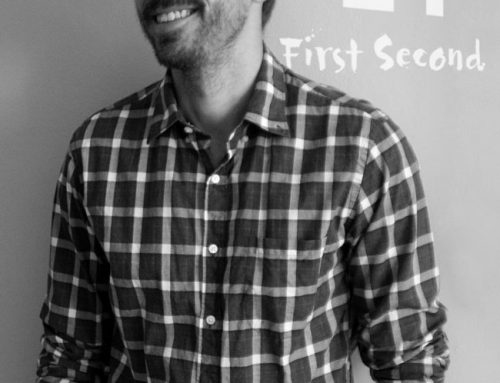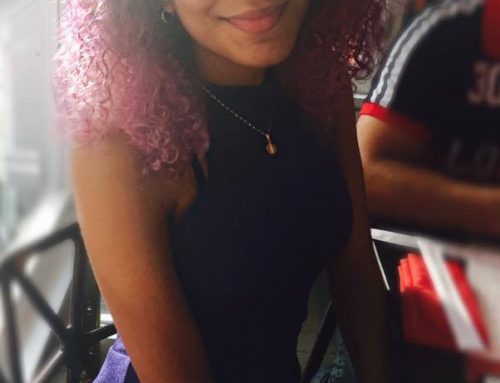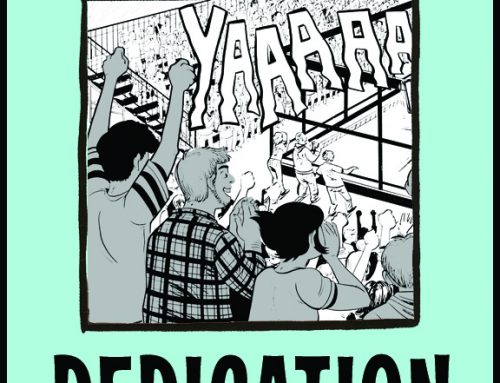test heading
A number of :01 authors have self-published their books, before or in addition to making graphic novels published by First Second. Here’s what they have to say about these two publishing routes.
My experience of self-publishing is limited to mini-comics. My very first comic was spat out of the art school photocopier, the covers screen printed by myself in the print room. It’s where I was first bitten by the comics bug, not just telling a story but overseeing the whole process of putting an object together from beginning to end. Choosing paper stock, designing covers and logos, figuring out page turns; everything down to stapling and folding by hand. It’s a blast and a great foundation to build from.
Working with a publisher is naturally more collaborative. Editors advise on stories, sales and marketing make decisions based on market conditions and trends, designers have to try and please everyone: the creators, marketing, editorial and themselves. When the graphic novel is finished, the pages drawn and scanned, cleaned up and corrected you hand it over, or less poetically, upload the digital files to the ftp. Let it go, as the song goes. Fortunately the people you’re handing it over to are very capable, experts in the areas you’re not, helping take the thing I made at home on sheets of paper with pens and pencils and putting it out into the world. It’s nice to know you have people on your side.
There’s also something deeply satisfying about folding a pile of photocopied pages in half, pressing two staples into the spine, setting it down in front of you and knowing, I made that.
Andi Watson, Princess Decomposia and Count Spatula
I love self-publishing and will never stop. It’s probably the only time when you’ll have total control of the presentation of your work, for better or worse of course. Self-publishing is a direct conduit between you and your reader with nothing in between. It’s also a good opportunity to experiment.
Working with a publisher requires satisfying other parties in the presentation of your work. The great thing about working with a publisher (besides the fact that more people will likely read your book) is that a group of colleagues really CARE about your work and have a stake in it. You have help in the creation of your comic from people who are skilled in the art of helping cartoonists make comics.
Many times your publisher (if they’re good) will think of a lot of stuff you never you thought of about your work and then they’ll explain it to you.
Box Brown, Andre the Giant
I was mostly surprised how much secret backstage work goes into self-publishing. When I had my first mini, Seeds of Good Fortune, printed up, I figured that the packing and mailing wouldn’t occupy too much of my time. When it was a busy week, and there were lots of orders, it was okay — you just allocate a few hours to it, and it’s worthwhile. But when there are only one or two orders in a week, having to take the time, get out the supplies, make a special trip to the post office, all that — enhh, it just starts to wear at you. I liked how much control I had over the production of the book, of course, and I’m up for those challenges (design, layout, printing technicalities), but I’m lucky I had an understanding project manager at the printers’, because I messed up a couple details.
I’ve done print-on-demand publishing with Lulu.com, and I liked that I could leave the printing and shipping up to someone else, AND I felt confident that the book would arrive safely in the readers’ hands (they pack those comics inside a cardboard brick). But it is not a good way to make any money, and when I was using it the books had that sort of laser-copier-like “print on demand” quality. Disclaimer: that was years ago.
Meanwhile, with Delilah Dirk and the Turkish Lieutenant, I’m not even sure what that would be like to try to achieve the same availability and presence in the book market that it has had with First Second. I’m sure there are a lot of things publishers do which I cannot even imagine. Maybe not, maybe it is really easy. :) I will say that the most relief I have ever felt in regards to exhibiting at a comic convention was when I was able to have a case of Delilah Dirk and the Turkish Lieutenant shipped from Macmillan’s warehouse in Virginia to the Fantagraphics store in Seattle in time for Emerald City. It meant I didn’t have to worry about carting boxes of books over the border from Canada and the potential hassles that might introduce. It was great. (Thank you, Gina!)
Also, if you’re REALLY lucky, your publisher will let you stay at their place during NYCC.
Tony Cliff, Delilah Dirk and the Turkish Lieutenant
Someone who worked in Hollywood once said to me, “Man, when you draw comics, you have to be in charge of everything! Acting, set design, hair and wardrobe, lighting, everything!” That is all completely true, and when you self-publish, there are even more responsibilities heaped on! Distribution, printing, promotion. It’s another full-time job on top of the actual production work!
The beauty of working with a publisher is that they can do a lot of the heavy lifting for you. You don’t need to worry too much about printing and marketing, and can be free to just create. When you self-publish, you live and die by your own sword. But therein lies the chief difference, and perhaps the deterrent for some. For self-publishing, the only gatekeeper is that of your own time, money, and energy. You’re in charge and every mistake is your own, as well as every victory! In working with a publisher, you have a much larger wall to scale. So much stress is lifted from your shoulders, but at times you can feel like some things are out of your control and aren’t done the way you’d hoped. So really, it all comes down to control and how much of it you need to function as a creator.
Having done both, I feel that working with a publisher is more satisfying to me at this point in my life. But I am certain I will self-publish again in the future. I have a lot of weird vanity projects in my head!
Zack Giallongo, The Stratford Zoo Midnight Revue Presents Macbeth
How is self-publishing different? The obvious ways are, well, obvious: if you want an advance, you pay it yourself (which means your bank balance doesn’t actually go up); you get to (or have to, depending how you look at it…it’s a double-edged sword) make all the deadline and design and production and marketing and sales and distribution decisions yourself; having made those decisions, you get to (or have to!) do the work that goes along with them, and; you don’t have to share all the riches that follow. (Unless, like me, you want to work with artists who draw better than you do. Then you do share the riches…and you need to define “riches” broadly.)
If that sounds like a hard road, it is, especially if you’re dealing with printed books. I’d be delighted if I never had to haul boxes up and down the stairs to my basement and prepare to ship them via UPS again. But I’m glad I’ve traveled that road, since it’s taught me what’s possible and what it costs — in time and money and effort — to make a graphic novel. And for good or ill, my self-published books hew as closely to my vision of what they could be as I could make them.
(That’s not to say that they’re all as good as I dreamed they would be. None ever match up to the ideal, perfect version of the book that got shelved in the corner of my brain the moment I thought of writing it. The art? Yeah, it’s usually better than what I imagined. The writing? Well, sometimes I wonder who hired that guy.)
By delegating some of the things I don’t do as well as I’d like to my friendly corporate overlords at First Second (Hi Mark! Hi Calista! Hi Gina! Hi Casey!), I lose a little control in every area I mentioned above. I don’t regret that either, because self-publishing helped me learn my blindspots and weaknesses, and has made me appreciate and benefit from having traveling companions on the publishing road.
Jim Ottaviani, Feynman
Self-publishing is a great way to get your start in comics! I got my start self-publishing, as did the vast majority of my cartoonist friends.
Self-publishing forces you to learn about every aspect of the comics industry. It also gives you complete control over your comic, from beginning to end. That’s why some cartoonists — like Jeff Smith and Jason Shiga — continue to self-publish even after they’ve signed with publishers.
Gene Luen Yang, The Shadow Hero




